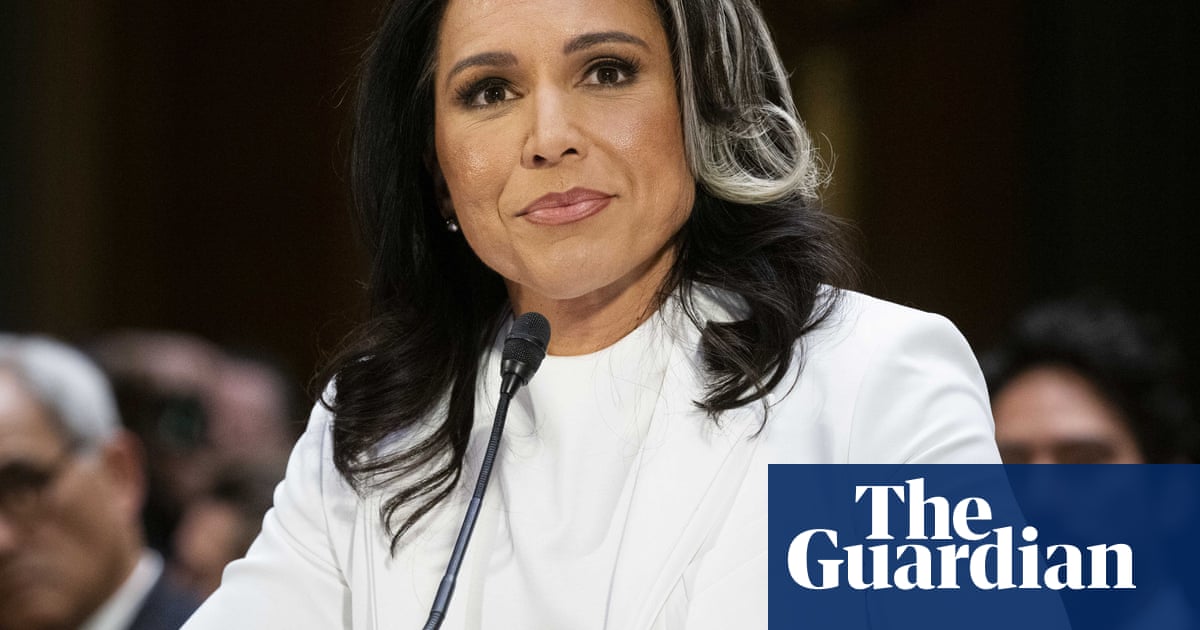Tulsi Gabbard, the US director of national intelligence, has fired the two highest-ranking officials at the National Intelligence Council (NIC) just weeks after the council released an assessment that contradicted Donald Trump’s justification for using theAlien Enemies Actto deport alleged Venezuelan gang members without due process.
Mike Collins was serving as acting chair of the National Intelligence Council before he was dismissed alongside his deputy, Maria Langan-Riekhof. They each had more than 25 years of intelligence experience.
The two were fired because of their opposition to the US president, Gabbard’s office said in an email on Wednesday, without offering examples.
“The director is working alongside President Trump to end the weaponization and politicization of the intelligence community,” the office said.
The firings follow the release of a declassified memo from the NIC that found no coordination between Venezuela’s government and theTren de Araguagang. The Trump administration had given that as reasoning for invoking the Alien Enemies Act and deporting Venezuelan immigrants. The intelligence assessment was released in response toan open records requestfiled by the Freedom of the Press Foundation.
The latest round of intelligence firings comes as Gabbard and her team aim to eliminate what they view as bias and inefficiency within the intelligence community.On Twitter/X, Gabbard’s deputy chief of staff, Alexa Henning, said the NIC officials, whom she referred to as “Biden holdovers”, were removed for “politicizing intelligence”.
While it’s not uncommon for new administrations to replace senior officials with their own picks, the firings of two respected intelligence officials who had served presidents of both parties has prompted concern. US congressman Jim Himes of Connecticut, the senior Democrat on the House Intelligence Committee, said he’s seen no details to explain the dismissals.
“Absent evidence to justify the firings, the workforce can only conclude that their jobs are contingent on producing analysis that is aligned with the President’s political agenda, rather than truthful and apolitical,” Himes said in a statement.
Though it’s not widely known to the public, the National Intelligence Council plays a key role in the country’s spy services, helping combine intelligence gathered from different agencies into comprehensive assessments used by the White House and senior national security officials.
Collins was considered one of the intelligence service’s top authorities on East Asia. Langan-Riekhof has served as a senior analyst and director of the CIA’s strategic insight department and is an expert on the Middle East.
Attempts to reach both were unsuccessful on Wednesday. The CIA declined to comment publicly, citing personnel matters.
Gabbard also is consolidating some of the intelligence community’s key operations, moving some offices now located at the CIA to buildings for the Office of the Director of National Intelligence (ODNI), her office said. They include the National Intelligence Council as well as the staff who prepare the president’s Daily Brief, the report to the president that contains the most important intelligence and national security information.
Sign up toFirst Thing
Our US morning briefing breaks down the key stories of the day, telling you what’s happening and why it matters
after newsletter promotion
The move will give Gabbard more direct control over the brief. While the brief is already ODNI’s responsibility, the CIA has long played a significant role in its preparation, providing physical infrastructure and staffing that will have to be moved to ODNI or recreated.
Gabbard oversees and coordinates the work of 18 federal intelligence agencies. She has worked to reshape the intelligence community – eliminating diversity, equity and inclusion programs under Trump’s orders and creating a taskforce to examine ways to cut costs and consider whether to declassify material relating to Covid-19 and other topics.
Gabbard also has vowed to investigate intelligence leaks and end what she said was the misuse of intelligence for political aims.
The Associated Press contributed reporting
